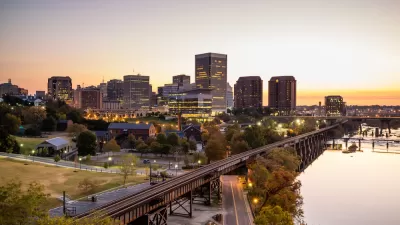Thanks to state and regional funding, the city eliminated fares while making service improvements.

“Many cities enacted fare-free transit options during the pandemic, both as a means to help essential workers and to limit interactions. But as life returns to a semblance of normal, some cities are backing away from the idea.”
Not so in Alexandria, Virginia, where buses remain free two years after fares were first eliminated during the early part of the pandemic, writes Jake Blumgart in Governing.
“Ridership on Alexandria’s buses has surged back to almost pre-pandemic levels not only because of free fares. A redesign of the bus system that allowed for increased frequencies is an equally important part of the story,” Blumgart notes. Critics of fare-free transit often argue that cutting fares often sacrifices service. In Alexandria’s case, state and regional funding allowed the city to maintain and improve service while keeping fares free. “Alexandria was able to compete for funds from Virginia’s Department of Rail and Public Transportation, which allowed them to provide free fares for the next three years. Competitive monies from the Northern Virginia Transportation Commission are used to increase frequencies on the city’s bus lines and redesign the system.”
City leaders are optimistic that they will be able to continue financing free fares and service improvements thanks to Alexandria’s robust tax base. “The city is in the midst of a decadeslong growth spurt and the population is the highest ever. Valuations of properties are greater than during the pandemic too, so Alexandria policymakers won’t face the hard choices of more depressed municipalities.”
FULL STORY: For This City, Fare-Free Transit Is a Big Success

Maui's Vacation Rental Debate Turns Ugly
Verbal attacks, misinformation campaigns and fistfights plague a high-stakes debate to convert thousands of vacation rentals into long-term housing.

Planetizen Federal Action Tracker
A weekly monitor of how Trump’s orders and actions are impacting planners and planning in America.

San Francisco Suspends Traffic Calming Amidst Record Deaths
Citing “a challenging fiscal landscape,” the city will cease the program on the heels of 42 traffic deaths, including 24 pedestrians.

Defunct Pittsburgh Power Plant to Become Residential Tower
A decommissioned steam heat plant will be redeveloped into almost 100 affordable housing units.

Trump Prompts Restructuring of Transportation Research Board in “Unprecedented Overreach”
The TRB has eliminated more than half of its committees including those focused on climate, equity, and cities.

Amtrak Rolls Out New Orleans to Alabama “Mardi Gras” Train
The new service will operate morning and evening departures between Mobile and New Orleans.
Urban Design for Planners 1: Software Tools
This six-course series explores essential urban design concepts using open source software and equips planners with the tools they need to participate fully in the urban design process.
Planning for Universal Design
Learn the tools for implementing Universal Design in planning regulations.
Heyer Gruel & Associates PA
JM Goldson LLC
Custer County Colorado
City of Camden Redevelopment Agency
City of Astoria
Transportation Research & Education Center (TREC) at Portland State University
Jefferson Parish Government
Camden Redevelopment Agency
City of Claremont





























